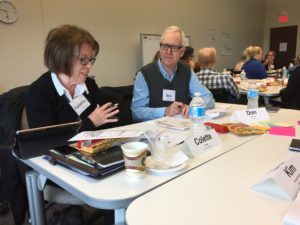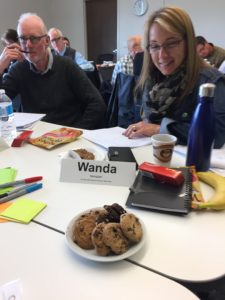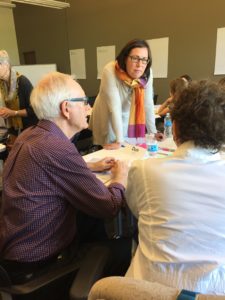|
Getting your Trinity Audio player ready...
|
Overwhelming. Haphazard. Afterthought.
These were just a few of the terms participants in Capacity Canada’s latest EvalU BootCamp tossed around to express their current feelings about the process of evaluation at the start of the day and a half event held June 6-7 at the charity’s home base in Waterloo.

Alison Sims, president of the K-W Skating Club, was among the 30 or so ‘campers’ representing social service agencies and community groups who signed on to learn more about the importance of evaluation and how it can steer an organization towards success.
She said her group – the largest skating club in Canada with more than 2,500 members – spent about 18 months creating a strategic plan and approving a framework.
“Now we’re at the point where we are getting reporting on the plan and what’s going on, and what the staff is doing,” said Sims. “We’ve recognized some desire for better measurement tools and being able to evaluate our successes and identifying if what we’re doing works.”
Hearing this type of revelation is almost music to the ears of long-time EvalU facilitators Julie Witmer and Catherine Lang, who say many non-profit organizations fail to take into consideration political, technical, policy and environmental shifts as they chart their future courses.
“I think what’s happening generally is the non-profit sector has done business as usual for so long and now they’re realizing they haven’t been cognizant about changes that have been going on around the organization,” said Witmer in an interview, prior to the start of the second day of the BootCamp which was funded courtesy of MCI under a partnership grant program.
She said organizations won’t be resilient if they’re not aware of the environment around them.

“It’s a big culture change within the organization of ‘how can we do things differently,’” said Witmer, noting that she and Lang – who’ve together conducted most of Capacity Canada’s seven EvaLU BootCamps – also adapt their training to meet the needs of the participants.
“At the start of each one we read the group and they tell us what they need. No two BootCamps have been the same,” she said.
Lang says many of the participants come to the BootCamps not only seeking professional evaluation but are hoping to take away new ideas to, in some way, move their leaders in a new direction.
“I have seen organizations that have tried to become innovative and adaptive, but they forget they need really good management systems, too,” she said, adding that failing to do this has resulted in staff leaving and programs begin to falter. “I think having a basic understanding of what they’re trying to accomplish and for whom, and what is really important.”
For Sims, she says the first step will be to assemble a team to help the skating club guide its evaluation process.
“But there’s a lot of anxiety around that and anxiousness, and wanting to get it done fast,” she said. “But I don’t think it’s a fast process and I think this (BootCamp) shows that.”

For Kim Krueger-Kischak, co-chair of the Early Literacy Alliance which encompasses 21-member organizations, she says taking part in the BootCamp has inspired her and some of her literacy-based colleagues to perhaps rethink the way they do things. In May, she said her group devised a survey within the organization regarding a new project.
“But now that we’ve gone through this (BootCamp), we’re wondering could we have asked things differently? Now we’re able to take the information we’ve learned the last day and a half and apply it going forward,” she said.

